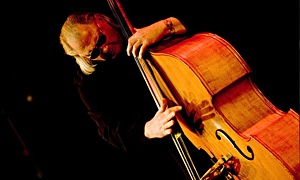Home » Jazz Articles » On and Off the Grid » The Importance of Being Earnest (or What It Takes To Be ...
The Importance of Being Earnest (or What It Takes To Be A Good Teacher)
Answer: Because there are too many bad teachers out there!
For some unknown reason people who have been playing their instruments for a few years think they can teach, especially when they don't know some of the basics themselves.
Through the years, I have had to teach the basics to guitar players who were playing sometimes up to six years. I have had students tell me that their former teachers would show them how to play and practice riffs by showing them the fingerings without telling them the names of the notes. Some students who, after playing four years, didn't know the difference between the low E and the high E, or which was the first string or the sixth string on the guitar. You'd be surprised how many don't know their key signatures, much less how to play a simple C scale or read a simple piece of music like "Yankee Doodle Dandy." Go to any college and ask any teacher how badly some of the incoming students were taught. I decided, since I now write for All About Jazz, I can talk about this problem because, believe it or not, it is universal.
If you go into teaching to teach beginners, intermediate, advanced or professionals—if you are doing it for the money, please quit now! Teaching is a calling. Something inside you must have a need to teach, share, help and enlighten others. I firmly believe we are here on this planet to help or give and there is nothing more rewarding than seeing a light go off in a student's eyes when you know he/she gets it.
There used to be a saying "those who can, do and those who can't teach." That may have been true fifty years ago, but it's not true now especially in this economy. Professional musicians need to wear many hats in order to survive. Another saying is "there are great teachers and great players, and if you are lucky, the person you study with is both." This is absolutely true especially if you study jazz. Through the years I have met teachers who really can't play and great players who shouldn't be teaching. So what is it you need to be a good teacher?
These are only my opinions, but I've been teaching since 1962 and think I can qualify as someone who knows.
As I said earlier, you need to want to help and you must have a genuine concern about the type of student you let loose on the world of music. Before you start off as a teacher, whether you're teaching jazz or not, ask yourself if you qualify as a teacher? Meaning, do you have the capability to relate to students and do you have the overall knowledge to do so in a methodical way? Just because you can play your instrument, and may want to teach, doesn't mean you can teach. You also have to decide at what level of student you can teach. Can you really teach an advanced or a professional? Don't kid yourself; if you take on advanced or professional students and you don't have it together, they'll know and, before you know it, the word will be out that you "can't teach." Keep this in mind. If you can't teach a beginner, you can't teach!
When a beginner student shows up for that first lesson, and after pleasantries and introductions are made, what do you do next? Have them blow, play, pick or bow a note? No! This student doesn't know one end of his chosen instrument from another. Because my expertise is in instrumental music some of these suggestions, but not all, could apply for vocal students too. Show and name the parts of the instrument and what those parts are used for. Next show them how to properly hold the instrument. Then teach them basic music principles such as clefs, bar lines etc. I know some kids come in and say they want to play rock 'n' roll or blues and expect to walk out sounding like Jimi Hendrix in the first lesson. It's up to you, the expert, to calm them down and explain it takes time, practice and patience to be a good player. If you succumb to what they want in that first meeting, you are doing a disservice to them and to yourself, and have given up control to a novice.
Usually a new teacher teaches the way they learned. When I started, I had no idea of what to do. Even though I had been playing twelve years, I really didn't have a "method." I resorted back to a book I had learned from and quickly realized there were things lacking. Some things were either too easy, or too hard, or not enough. Eventually I came up with my own way and most of the time I would write out the lessons. Nowadays because of computers, I have my lessons on PDFs and I don't have to waste time writing or copying.
As a teacher, it's not enough to know the information; you have to be able to teach it in a way that is understandable to another person. You can't' assume, because you know and understand it, your student will comprehend it too. I have always found that the simpler you make it the easier it is to understand. No matter how complicated or hard it can be there is always a way to break it down and simplify.
If a new student comes to you and says he/she is at the intermediate level, don't take them at their word and don't assume they know some things; test them and make sure they are what they say they are. You'd be surprised at how many times a new student would say" I am playing ten years" and they still need to learn some basics and have so many bad habits that I would practically start them off as a beginner.
As a teacher you must evaluate your students in many ways. What kind of personality do they have? Are they somber, happy, moody etc.? How much work can they handle? Do you need to come down on them because he/she is lazy? Do you have to teach with a light touch? How much time do they have to practice? Many parents believe in keeping their kids busy. So besides school and music lessons, they might be on the soccer team, boy/girl scouts etc. The list goes on and on. You have to take all of this into account and decide what the best way to teach your student is. Sometimes the kid just doesn't have time for music and you can tell by the way they come in, prepared or unprepared. If they are yawning throughout the lesson, doesn't mean they are bored, they are probably exhausted from all they have to do. You may have to tell the parent that the kid is too busy for music lessons and that you would just be stealing their money if they continued. It's a hard choice, but if you are in it for the money as I said before, then quit!
Your best attribute as a teacher will be your honesty. You need to be honest to yourself and to your students and their parents. It's also important how you look, especially if you are taking on a young student who is accompanied by a parent. Dress like a professional. It gives you an air of authority and dignity. You may want to stay nice and loose, but you can be loose and dressed well too.
If you are building a teaching practice it is best for your students to bring a pad so you can write down the date and what you are giving them for a lesson. You would be surprised how fast you or they can forget what you taught. This is a failsafe against "Oh, I forgot" or , "You didn't give me that." Always keep the parent in the loop. If you student has a good lesson, tell the parent in front of the student. If the opposite is true don't be afraid to do the same thing. If you have to, set up a practice schedule for your student. There's nothing wrong with going that extra mile, too. If your lessons are supposed to be 45 minutes to an hour and you need extra time to get a point across, take the extra time. Your responsibility as a teacher doesn't stop when they walk out the door. Take advantage of the Internet. If there is something you think your student might need to expand their talent and you see it on the net, send them the link.
You may think of teaching as a part-time job to expand your income, but it takes a full-time effort to do it well. Teaching can also be a great learning tool for yourself as well. It will teach you to be patient. All the best teachers, whether it's in music or something else, show a love for what they are doing and great teachers inspire. Show your students how much you enjoy doing what you do. I had a teacher who loved what he did and in turn I loved to go for lessons each week—and, because of the way he was, I never brought in a bad lesson or had to repeat a lesson. When I think back to my early years, he was like a father to me. He recognized what I had and he nurtured it.
We in the arts have a special opportunity to be able to love what we do and enhance the world with our talent. In essence, that thing we do is not a job anymore, it's a lifestyle and we are lucky to have it. How many people can say they love their work? Not many.
So if you want to teach, teach and do it well. It is an obligation, a responsibility and for God's sake, do it in earnest!
< Previous
The Noguchi Sessions
Next >
Altitude
Comments
Tags
For the Love of Jazz
 All About Jazz has been a pillar of jazz since 1995, championing it as an art form and, more importantly, supporting the musicians who create it. Our enduring commitment has made "AAJ" one of the most culturally important websites of its kind, read by hundreds of thousands of fans, musicians and industry figures every month.
All About Jazz has been a pillar of jazz since 1995, championing it as an art form and, more importantly, supporting the musicians who create it. Our enduring commitment has made "AAJ" one of the most culturally important websites of its kind, read by hundreds of thousands of fans, musicians and industry figures every month.























